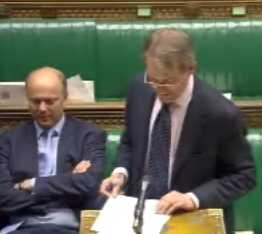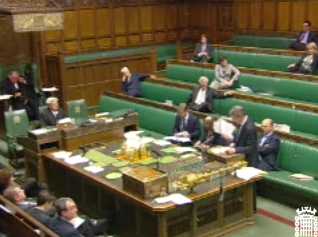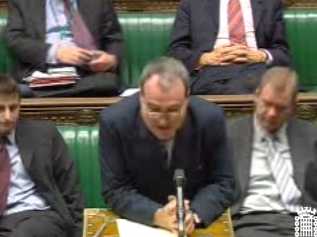 "Unless we're prepared to face up to the reality of road pricing it (congestion) will get worse." So said Stephen Ladyman, transport minister, winding up an opposition day debate last night, reinforcing the recommendation of Sir Ron Eddington in his report earlier this week.
"Unless we're prepared to face up to the reality of road pricing it (congestion) will get worse." So said Stephen Ladyman, transport minister, winding up an opposition day debate last night, reinforcing the recommendation of Sir Ron Eddington in his report earlier this week.If left unchecked, 13 percent of traffic would be subject to stop-start travel conditions by 2025 says the former chief executive of British Airways, a man known for reversing the rebranding of the BA aircraft fleet. Charging drivers could reduce carbon emissions and save the economy up to £28bn in time wasted by delays by 2025, saving five percent in travel time.
 This is the government's prescription for improving road travel in the UK, a government which, as shadow transport minister Owen Paterson (pictured right) told the House, took £400 billion in taxes from road users in the last ten years, yet spent only £7 billion per year on roads. And that was in a decade in which traffic grew by 29 percent while road capacity increased by less than two.
This is the government's prescription for improving road travel in the UK, a government which, as shadow transport minister Owen Paterson (pictured right) told the House, took £400 billion in taxes from road users in the last ten years, yet spent only £7 billion per year on roads. And that was in a decade in which traffic grew by 29 percent while road capacity increased by less than two.However, to achieve what amount to a magical situation – reducing congestion while not actually spending any more money on roads – there is a small catch. A nationwide system of road charging must be in place by 2015. And there lies a very, very large elephant in the room – our old friend the European Union, mention of which is curiously absent from the Eddington report.
The "elephant" comes in the form of EC Directive 2004/52 on the “interoperability of electronic toll collection systems”. This was agreed on 30 April 2004 and entered in force on 20 May 2004. It is not yet transposed into UK law although the date mandated in the Directive was November 2005. The government is, therefore, over a year late, already, although the first provisions of the Directive to take effect will not do so until 1 January 2007.
The crucial issue, however, is the second part of the directive which sets up the European Electronic Tolling Service (EETS). This is intended to allow vehicle operators to subscribe to access any electronic charging scheme in Europe with a single piece of on-board equipment, and potentially receive a single bill covering all transactions, and it thus requires every electronic charging system in the EU to comply with a single European standard.
 As Paterson told the crowded chamber, full of hard-working MPs (pictured), the immediate problem is that the standard is not yet defined. It was supposed to be defined by a Commission Decision, supported by a vote of a Regulatory Committee - the Comité Télépéage - by 1 July 2006. That deadline has now passed and the British government is openly admitting that there is still considerable further negotiation needed to develop an EETS that is "workable and cost-effective".
As Paterson told the crowded chamber, full of hard-working MPs (pictured), the immediate problem is that the standard is not yet defined. It was supposed to be defined by a Commission Decision, supported by a vote of a Regulatory Committee - the Comité Télépéage - by 1 July 2006. That deadline has now passed and the British government is openly admitting that there is still considerable further negotiation needed to develop an EETS that is "workable and cost-effective".The word "considerable" applies not only to the negotiations but also the degree of understatement. The technology for large-scale road charging is what is known in the trade as "immature". It will be affected both by technical changes and political developments and by the progress of the EU's own Galileo system. This is running late and has no reliable date for its introduction.
Until the technical and then the regulatory framework has been firmed up, however, it will not be possible to establish EETS and without that, no EU member state can seriously think about setting up a full road charging system. And even without the delays, the timetable was already tight – the Directive not anticipating EETS coming into force for cars until 2012.
 With both regulatory and technical delays stacking up, it seems almost inconceivable that the government can meet a 2015 timetable. Thus did Owen Paterson ask Ladyman (pictured) what guarantees he could give that his Department could meet the 2015 timetable.
With both regulatory and technical delays stacking up, it seems almost inconceivable that the government can meet a 2015 timetable. Thus did Owen Paterson ask Ladyman (pictured) what guarantees he could give that his Department could meet the 2015 timetable.Strangely, in a winding up speech larded with political thetoric and finger-pointing, Ladyman chose to ignore the question, leaving wide open our suspicion that this Labour government is seeking to use Eddington as "a shield and an excuse for another nine years of inactivity", saving money for Gordo to bolster up his failing finances.
Thus does the EU work in wondrous ways, this time giving the Labour government an alibi for not spending any money on our road transport system. And, needless to say, nothing of this will be reported by the MSM. Not only did you see it here first, this is the only place you will see it.
COMMENT THREAD
No comments:
Post a Comment
Note: only a member of this blog may post a comment.